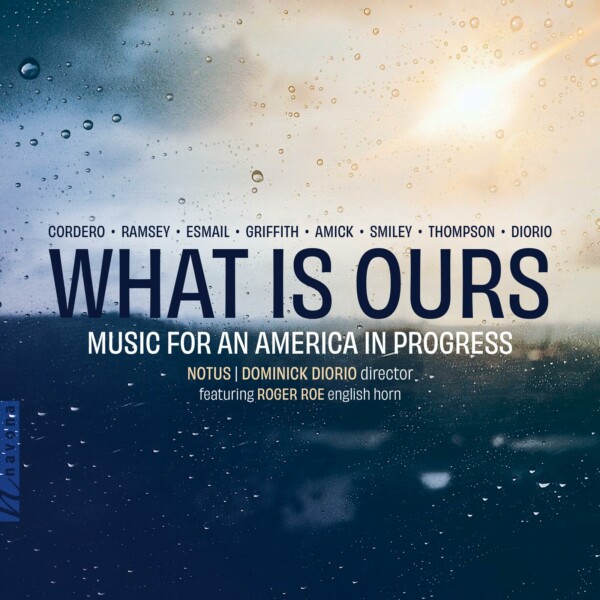There are generally two ways one can face a crisis. One can give up, or one can persevere and use it to one’s advantage. Choir director Dominick DiOrio definitely chose the latter during the pandemic, turning his reflections and sentiments about it into a profoundly engaging, almost philosophical choral album titled WHAT IS OURS. DiOrio conjures a formidable cross-section of music by a range of contemporary composers that not only reflects the diversity and multiplicity of modern-day America, but also its underbelly of struggle, challenge, and an eventual triumph of humanity.
Today, Dominick is our featured artist in “The Inside Story,” a blog series exploring the inner-workings and personalities of our composers and performers. Read on to learn more about the modern historical events that inspired this album, and a sneak peek into the ensemble’s upcoming projects…
What is NOTUS’ mission and purpose? / Who is NOTUS?
NOTUS is a new music chamber choir dedicated to performing the work of living composers. Made up of approximately 35-40 undergraduate and graduate music majors, it is a curricular ensemble from the Indiana University Jacobs School of Music, one of the largest music schools in the world. Founded in 1980 by Alan Harler as the Contemporary Vocal Ensemble, I rebranded the group when I took over in 2012 to help create a new profile for ourselves in the world of new music.
Why a new music chamber choir?
The music of our time is in many ways “our music” — reflective of our world, our society, our problems, and our hopes. I feel humbled and honored to lead a group dedicated to inspiring the passion for the living art in today’s young people as they begin their musical careers. I also want to prepare these young people for the realities of a choral landscape that is increasingly populated by exceptionally skilled professional chamber choirs — I want them to leave their time at IU feeling “ready” to audition and earn placements in these great ensembles. And we are pretty much it… there isn’t really any other university ensemble in the United States solely dedicated to new music like we are.
Why is it important to expose young musicians to living composers?
Studying for a degree in music is a demanding endeavor. From classes in theory, history, literature, and performance to private lessons, chamber music, and ensemble rehearsals, students receive a lot of important training and instruction in a short period of time. Part of the piece that can sometimes be missing is the connection and creation with the living art form, with the composers in their moments of inspiration, with the poets and the texts they voice — this is critical to not only training our students to be excellent performers, but to also awaken in them a curiosity for the unknown, the new, and the not-yet-discovered. Living music is just that: alive with the possibilities of an art form in motion. Every student needs that, and NOTUS helps to provide it at IU.
On “What Is Ours” you aim to create “music for an America in progress.” Why did you choose this theme?
Thanks in part to the invitation to perform at the 12th World Symposium on Choral Music in Auckland, New Zealand, we were originally planning to take the program to an international audience as a representation of some of the best and most interesting music being written in America today. While the conference was ultimately canceled due to COVID-19, we didn’t want to let the project die away, and so we prepared it for performance in Chicago in 2022 and this album is another outgrowth of that.
As to why “music for an America in progress” — I think the recent events of our world kind of answer that question. From a lackluster global pandemic response to a racial reckoning, the last few years have been incredibly disruptive, and it is in the “ruptures” that interesting new art can be made. We wanted to be a part of that conversation, to say: “we have values that we believe in, and we want to share them in song.”
Can you guide us a bit into how that manifests in some of the tracks on the album?
So take Carlos Cordero’s opening plea “help me!” — he is responding to a crisis in Venezuela, his home, from his vantage point now living in the United States, a perspective of many Americans who leave their native country to find new opportunity in the United States. That’s reflective of so many Americans’ experiences.
Or Reena Esmail’s Tuttarna, a work born out of her study of Hindustani classical music, infused with her classical composition training in American conservatories at Juilliard and Yale — she has a unique voice unlike anyone else’s — a clear sign of American “progress” in music.
Or Joel Thompson’s America Will Be!, a literal statement of hope and possibility for imagining a better country, government and society, after acknowledging the original sin of slavery in our founding. We can be better — we can imagine a better world.
And Khashayar Tonekaboni’s poem in my work A Chain is Broken hints at this too — as we learn to recognize ourselves in others, barriers fall away, connections are made, and real progress is possible. That’s what I hope people hear on the album.
What are some exciting upcoming projects for NOTUS?
Since we toured and recorded last year, this year is “quieter” but for us that means performing two important major choral works of the last half-century — Alfred Schnittke’s Requiem in Nov 2022 and Sarah Kirkland Snider’s Mass for the Endangered in Feb 2023 — and we have a concert of many premieres coming up in March 2023, including one by composer Chi Wang called Dynamic Equilibrium which incorporates live electronics and newly created sound/data hardware that will be responsive to the movements and sounds of the chorus. Really cool stuff, for sure — but that’s just kind of the musical world we like to live in!
Explore Dominick’s Latest Release
WHAT IS OURS
WHAT IS OURS is available now from Navona Records. Click here to visit the catalog page and explore this album.
The views and opinions expressed in this post are those of the artist and do not necessarily represent or reflect the views and opinions held by PARMA Recordings LLC and its label imprints, subsidiaries, and affiliates.




